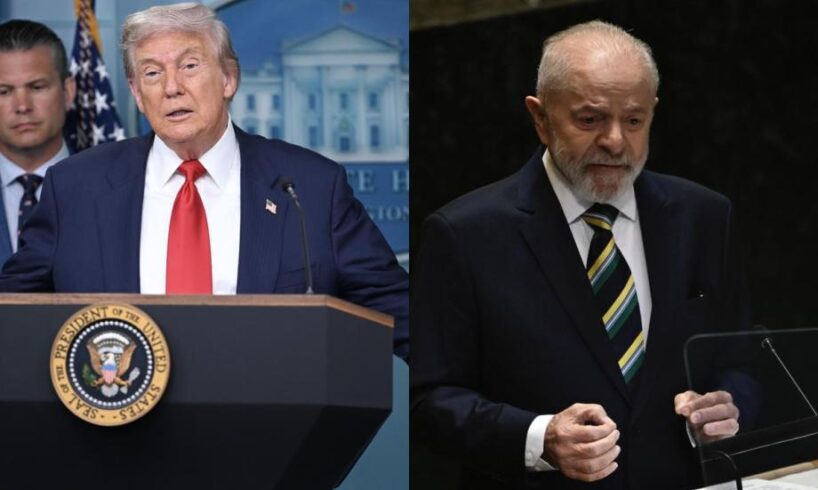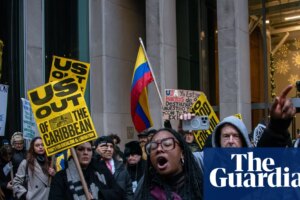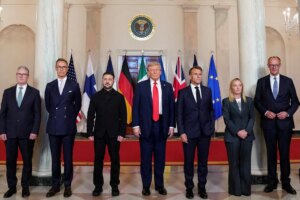
US President Donald Trump escalated tensions with Brazil on Friday (5), labeling the South American country’s current government as “radical left” and suggesting that Brazilian officials could be barred from attending the upcoming United Nations General Assembly in New York. The statement came during a White House press conference, where Trump expressed anger at Brazil’s recent political and diplomatic positions, including its increasingly vocal support for Palestine.
“We are very angry with Brazil. We’ve already imposed heavy tariffs because they’re doing something very unfortunate,” Trump said.
The comment referred, in part, to a series of up to 50 per cent tariffs the US imposed on Brazilian products in August, a move Trump defended as retaliation against what he sees as Brazil’s ideological drift under President Luiz Inácio Lula da Silva. Trump’s anger has been fueled not only by Brazil’s domestic politics, including the prosecution of former President Jair Bolsonaro, but also by its foreign policy, which has increasingly diverged from Washington’s priorities.
Donald Trump disse estar “chateado” com o Brasil porque Lula seria “comunista”.
É sempre assim: quando falta argumento, sobra rótulo vazio.
Chamar Lula de comunista é como chamar Trump de intelectual não faz sentido nenhum.
O que realmente incomoda Trump é ver o Brasil… pic.twitter.com/wubTmo8bkH
— Beta Bastos (@roberta_bastoss) September 5, 2025
Brazil’s open diplomatic support for Palestine has emerged as a key point of contention in its relationship with Trump-aligned US leaders. Under Lula, Brazil has repeatedly condemned Israeli military actions in Gaza, called for ceasefires, and advocated for Palestinian statehood on the international stage positions that contrast sharply with Trump’s staunch pro-Israel policies.
In October 2023, Brazil chaired a United Nations Security Council meeting where it pushed for a humanitarian resolution in Gaza, a proposal vetoed by the United States. Lula has also criticized the Israeli government’s treatment of Palestinians and voiced solidarity with the Palestinian cause during speeches at international forums.
Such positions have drawn criticism from right-wing figures in both the U.S. and Israel, who view Brazil’s stance as part of a broader leftist alignment that includes sympathy toward governments in Venezuela, Cuba, and Iran. For Trump, Brazil’s tilt toward non-aligned and pro-Palestinian diplomacy is seen as part of its transformation into what he now calls a “radical left” state.
Israel is a talisman for fascists around world for a reason: they see their ideology realised in the entity
I was in Brazil recently + went to a Bolsonaro rally. 1 thing was immediately noticeable: there were more Israeli flags than Brazilian flags
Same for Trump, Milei, Orbán pic.twitter.com/BAqoqGydIp
— Matt Kennard (@kennardmatt) August 30, 2025
Trump continues to defend Jair Bolsonaro, his ideological ally in Brazil, who is currently facing charges in the Supreme Federal Court (STF) related to alleged coup attempts and anti-democratic actions. The case is being led by Minister Alexandre de Moraes, a figure increasingly targeted by US conservatives for his role in what they describe as political persecution.
The alignment between Trump and Bolsonaro’s allies was further solidified after investigations were launched against Bolsonaro’s son, Congressman Eduardo Bolsonaro (PL-SP), following alleged collaboration with extremist groups abroad.
As part of his response, Trump not only imposed tariffs on Brazilian goods but also floated the idea of denying diplomatic visas to Brazilian officials planning to attend the UN General Assembly, an extraordinary threat against a fellow UN member state.
The prospect of the US denying access to foreign diplomats for political reasons, has sparked alarm among international observers. Such a move would not only set a dangerous precedent but also raise questions about the impartiality of the United States in its role as a global convener.
At its core, the escalating conflict between the US and Brazil under Trump and Lula, respectively, reflects a deepening ideological divide. Trump’s disdain for Brazil’s support for Palestine, its criticism of Israel, and its diplomatic ties with global south movements is in sharp contrast to the nationalist, pro-Israel, and anti-globalist agenda that defines Trump-era foreign policy.
For Brazil, its current posture is part of a broader reassertion of independent foreign policy, one that emphasizes multilateralism, human rights, and a more balanced global order. But that shift is increasingly putting the country on a collision course with right-wing governments like Trump’s.
Trump’s irrational Brazil tarrif’s have given Lula a bump in the polls, but have also given hope to the far right Liberal Party, who are waging an uphill battle trying to get their leader, Jair Bolsonaro, out of Jail. My story @telesurenglish pic.twitter.com/vsoOjHBQC9
— BrianMier (@BrianMteleSUR) August 15, 2025
Whether these tensions lead to long-term diplomatic fallout remains to be seen. But for now, Brazil’s place on the world stage, and its role in defending the Palestinian cause, is once again at the center of international controversy.
The views expressed in this article belong to the author and do not necessarily reflect the editorial policy of Middle East Monitor.





